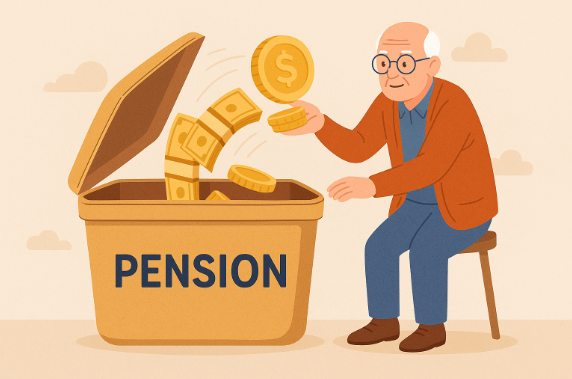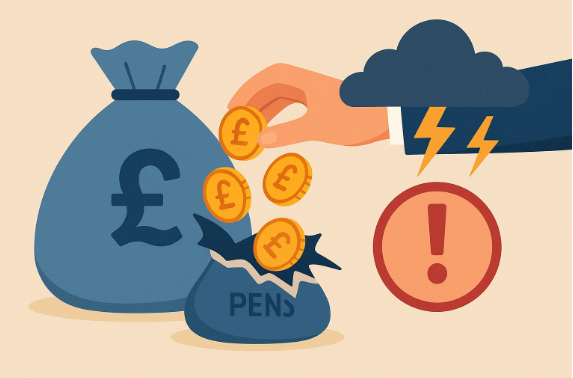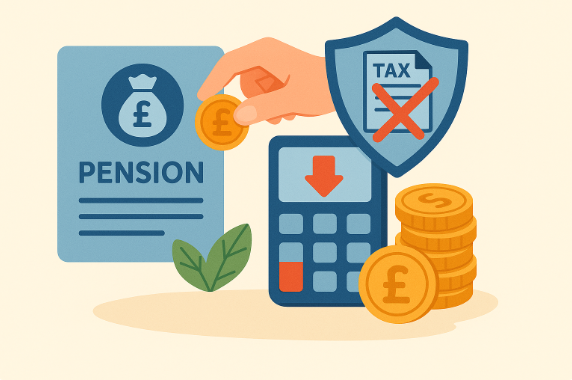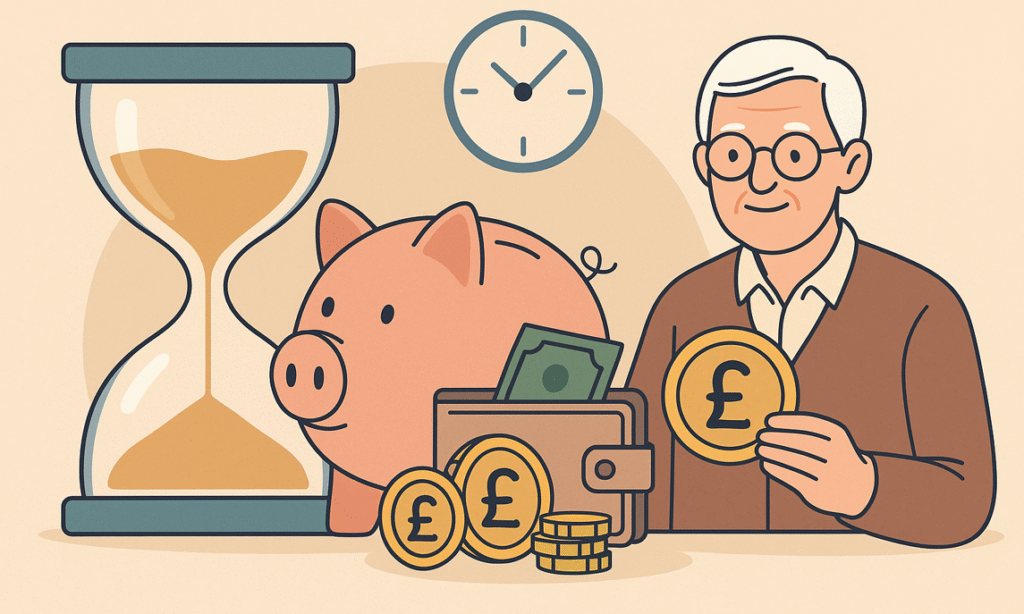Introduction: Can You Take Money Out of Your Pension at Any Time in the UK?
If you’ve been saving into your pension, you may ask: Can you take money out of your pension at any time in the UK? The answer is no. Pensions are long-term savings designed for retirement, and UK rules restrict access until age 55 (rising to 57 in 2028), except in rare cases of ill health.
Once you reach that age, pension freedoms allow you to choose how to take money—either as a tax-free lump sum, flexible drawdown, or guaranteed annuity. But every choice has tax consequences. This guide explains when you can access your pension, how much tax you’ll pay, and step-by-step withdrawal examples.
At what age can you take money out of your pension in the UK?
The government sets a minimum pension age:
-
Currently 55 years old
-
Rising to 57 years old in April 2028
Step-by-step: How to know if you can withdraw now
-
Check your pension scheme – Is it a defined contribution (DC) or defined benefit (DB) scheme?
-
Confirm your age – Are you 55 or older (or 57 from 2028)?
-
Look at scheme rules – Some DB schemes may restrict lump sums.
-
Consider exceptions – You may access earlier if you have ill-health or a protected retirement age.
Can you take all of your pension money out at once?

Yes, you can take your entire pension in one go—but it usually leads to a large tax bill.
When you cash in your pension pot:
-
The first 25% is tax-free.
-
The remaining 75% is taxed as income in the year you take it.
This matters because large withdrawals may push you into a higher tax band.
What are the different ways to take money out of a pension in the UK?
1. Lump sum withdrawal
-
25% usually tax-free
-
Remainder taxed as income
-
Best for one-off expenses like clearing debts
Step-by-step lump sum withdrawal:
-
Contact your pension provider
-
Request tax-free cash + lump sum
-
HMRC applies PAYE tax on taxable portion
-
Payment sent to your bank
2. Pension drawdown
-
Keep pension invested, withdraw flexibly
-
Potential growth but risk of running out of money
Step-by-step drawdown:
-
Transfer pension into a drawdown plan
-
Take 25% tax-free (if desired)
-
Decide annual or monthly withdrawals
-
Pay income tax on taxable portion
-
Monitor investments regularly
3. Buying an annuity
An annuity is when you exchange your pension pot for a guaranteed income for life.
Advantages:
-
Peace of mind—your income never runs out.
-
Options to protect against inflation.
Disadvantages:
-
Once bought, you usually can’t change it.
-
If you die early, your family may get little or nothing.
Best for: People who want stable income without investment risk.
What happens if you take money out of your pension early?

If you try to access your pension before the minimum age (55 now, 57 from 2028), you face severe penalties.
-
HMRC penalty tax of up to 55% on unauthorised withdrawals.
-
High risk of falling victim to pension scams, where fraudsters promise early access but steal your savings.
📌 Key warning: If anyone offers to “unlock” your pension early, it’s almost certainly a scam.
How much tax do you pay when you take money out of your pension?
The tax depends on your pension size, other income, and UK tax bands. Here are three worked-out examples:
| Pension Pot | Other Income | 25% Tax-Free Amount | Taxable Amount | Tax Breakdown | Total Tax Paid | Final Payout |
|---|---|---|---|---|---|---|
| £30,000 | £0 salary | £7,500 | £22,500 | £12,570 at 0% = £0 £9,930 at 20% = £1,986 |
£1,986 | £28,014 |
| £100,000 | £20,000 salary | £25,000 | £75,000 | Combined income = £95,000 £12,570 at 0% = £0 £37,700 at 20% = £7,540 £44,730 at 40% = £17,892 |
£25,432 | £74,568 |
| £250,000 | £0 salary | £62,500 | £187,500 | £12,570 at 0% = £0 £37,700 at 20% = £7,540 £99,730 at 40% = £39,892 £50,070 at 45% = £22,531 |
£69,963 | £180,037 |
📌 Clear takeaway: The bigger the withdrawal, the higher the tax bill—especially once income crosses into the 40% and 45% brackets.
Can you take money out of your pension while still working?
Yes, you can take pension money while still employed. But there are downsides:
-
Withdrawals increase your taxable income, which could push you into a higher tax band.
-
Taking money may trigger the Money Purchase Annual Allowance (MPAA). This reduces how much you can contribute tax-efficiently to pensions in the future—from £60,000 to £10,000 per year.
Example:
-
You earn £40,000 salary.
-
You withdraw £20,000 pension.
-
Total income = £60,000.
-
Some pension money taxed at 40%.
Should you take money out of your pension at any time?
Even if rules allow you to withdraw, think carefully. Consider:
-
Do you need the money now?
-
Will tax eat a big chunk of your pot?
-
Will you still have enough for later retirement?
Former Pensions Minister Steve Webb warns:
“Withdrawing in one go is almost never the best option. A measured approach helps reduce tax and secures long-term stability.”
How can you reduce the tax you pay when taking money from your pension?

Taking money from your pension isn’t just about what you can do—it’s about how to do it tax-efficiently. The way you withdraw can make a big difference to how much you keep. Here are practical strategies to minimise your tax bill:
1. Take smaller withdrawals instead of one big lump sum
-
If you withdraw in smaller chunks, you’re less likely to move into a higher tax band.
-
Example: Taking £20,000 a year over 5 years may cost less tax than taking £100,000 in one year.
2. Time withdrawals around your salary or retirement
-
If you’re still working, your salary pushes you into a higher tax bracket.
-
Consider waiting until you retire or reduce your hours to take larger withdrawals.
3. Use ISAs alongside pensions
-
After taking your 25% tax-free cash, consider moving money into an ISA.
-
ISA withdrawals are completely tax-free, unlike pension withdrawals.
4. Split withdrawals across tax years
-
UK tax years run from 6 April to 5 April.
-
By withdrawing part before April 5 and part after, you use two personal allowances, reducing tax.
5. Combine annuity and drawdown
-
Using part of your pension to buy an annuity gives you guaranteed income.
-
Leaving the rest in drawdown allows flexibility and tax planning.
Comparison: Tax-Saving Pension Withdrawal Strategies
| Strategy | How It Works | Tax Advantage | Best For |
|---|---|---|---|
| Smaller Withdrawals | Take money gradually instead of a lump sum | Avoids moving into higher tax bands | People who don’t need all the cash at once |
| Time Around Salary | Delay withdrawals until income is lower | Pay tax at lower rate | People near retirement or reducing work hours |
| Use ISAs | Move savings into an ISA after tax-free cash | ISA withdrawals are tax-free | Savers wanting flexibility and no tax on growth |
| Split Across Tax Years | Take money before and after April 5 | Two personal allowances = less tax | Anyone with medium/large pots |
| Mix Annuity & Drawdown | Buy annuity for secure income, leave rest in drawdown | Balance of stability + tax planning | Retirees wanting guaranteed income + flexibility |
Conclusion: Can you take money out of your pension at any time in the UK?
The answer is no—you cannot take money out of your pension at any time in the UK. Most people must wait until age 55 (57 in 2028), and every withdrawal is subject to UK tax rules.
While you can withdraw all your pension, calculations show that lump sums often lead to high tax bills. Alternatives like drawdown or annuities may protect your retirement income better. Always consider your long-term needs before taking money out.
FAQs on Taking Money Out of Your Pension in the UK
Can I cash in my pension at 30?
No. Only in cases of severe ill health can you access pensions before 55.
How much tax will I pay if I take £10,000 out of my pension?
-
£2,500 tax-free (25%)
-
£7,500 taxed at 20% = £1,500
-
Total received = £8,500
What happens if I take my pension at 55?
You can access your pot, but tax rules apply. 25% is tax-free; the rest is taxed as income.
Can I keep paying into my pension after withdrawing?
Yes, but if you trigger MPAA, your annual tax-relieved contributions fall to £10,000.
Is it better to take small amounts instead of one large sum?
Yes. Taking money gradually often reduces tax liability and helps your savings last longer.

I’m Adam Milne, a business writer and co-author at UKBusinessMag.co.uk. I’m passionate about simplifying complex topics—whether it’s tax, startup strategy, or digital marketing—so that entrepreneurs can take action with confidence. With years of experience in small business consultancy, I bring a practical perspective to every piece I write, helping readers turn ideas into results.



